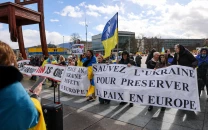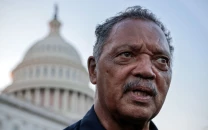Druze in shock as Israel-Hezbollah war hits home
Druze community in the Golan Heights mourning 12 youngsters killed in a missile strike at the weekend
1722320553-0/BeFunky-collage]-(92)1722320553-0-640x480.webp)
For many of the Druze community in the Golan Heights mourning 12 youngsters killed in a missile strike at the weekend, the carnage came as a shock despite the months of daily rocket fire and air strikes between Israel and southern Lebanon.
Even when the rockets were flying elsewhere, the community felt largely safe, said Raya Fakher Aldeen, a resident of Majdal Shams, the Druze village where children and teenagers were playing football when the missile landed on Saturday.
"It was a shock because not once in the last nine months, even when the sirens were sounding, did we feel we were being targeted," she said.
Israel has accused the Iranian-backed Lebanese group Hezbollah of carrying out the strike and on Monday, during a visit to Majdal Shams, Prime Minister Benjamin Netanyahu promised a "harsh response".
Hezbollah denies killing the youngsters but said it had launched strikes on what it said were military targets in nearby areas of the Israeli-occupied Golan Heights.
As members of an Arab minority straddling Israel, Lebanon, Jordan, Syria and the Golan Heights, the Druze, who practise a form of Islam, occupy a special niche in the complicated politics of the region.
Unlike most Israeli Palestinians, many Druze in Israel serve in the military and police, including during the war in Gaza, and some have reached high rank.
But in the Golan Heights, an area seized from Syria in the 1967 Middle East war and later annexed by Israel in a move not generally recognised internationally, many still identify as Syrians and refuse Israeli citizenship.
The ambiguity of the Druze position was reflected in the resolutely non-political funeral. Thousands mourned in Majdal Shams on Sunday but there was no sign of either Israeli or Syrian flags and political talk was largely absent.
"Many Druze feel angry and do not want to be fuel in this war for any side," said Fakher Aldeen.
The standoff between Israel and Hezbollah, which began soon after the Hamas-led attack on Israel on Oct. 7, has forced the evacuation of tens of thousands of people on both sides of the Israeli-Lebanese border, but has so far stopped short of the full-scale war that many now fear.
Sultan Abu Jabal, a 62-year-old who works and lives in Majdal and who lost a granddaughter in the attack, denounced what he said was a "crazy war".
"They are all innocent people. Why is it my problem if there are troubles between Hezbollah and Israel?"
No escaping regional politics
However the politics of the region is inescapable and though the youngsters killed in the strike do not appear to have held Israeli citizenship, Israeli officials including Prime Minister Benjamin Netanyahu and Defence Minister Yoav Gallant have embraced them as their own.
"A Jewish child murdered on the Gaza border on Oct. 7 and a Druze child murdered on the Golan Heights are the same. These are our children," Gallant said during a visit to Majdal Shams.
On the other side of the dividing line, Lebanese Druze leader Walid Jumblatt, a former Hezbollah opponent who has since reconciled with the movement, told Al Jazeera television the Israeli claim that Hezbollah fired the rocket was a fabrication.
On the Syrian side, Druze Sheikh Yousef al-Jarbou offered prayers for the dead and accused Israel of "committing daily massacres" in a speech published by Syrian state media, accompanied by a photo showing Syrian and Druze flags behind him and a photo of President Bashar al-Assad, a Hezbollah ally.
"The incident is being exploited by all sides," said Lubna Al Bassit, an anti-Assad activist in Sweida, the Druze capital of Syria, who reflects the views of Druze who blame Iran and Hezbollah.
"There's rivalry. Who is the real voice of the Druze community - is it the Israeli Druze who are integrated in Israel and serve in the army, or is it the Lebanese who have been taking a stance against Israel, specifically Jumblatt who is a historic leader of the Druze," said Mohanad Hage Ali of the Carnegie Middle East Center.
As Lebanon braces for Israeli strikes that are expected to be much heavier than those seen so far in the war, the Druze of Majdal Shams are left to wait.
"We hope this war will end and this massacre will be the last one in this devastating war," said Sheikh Salim Abu Jabal. "We call for peace. We don't attack anyone and we don't accept being attacked by anyone."



















COMMENTS
Comments are moderated and generally will be posted if they are on-topic and not abusive.
For more information, please see our Comments FAQ